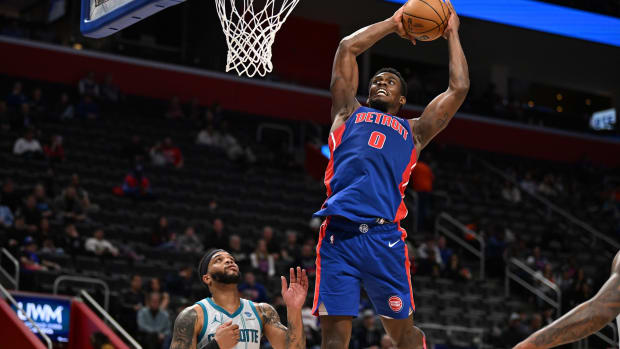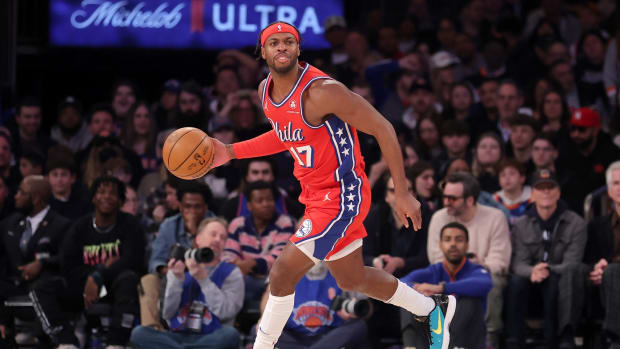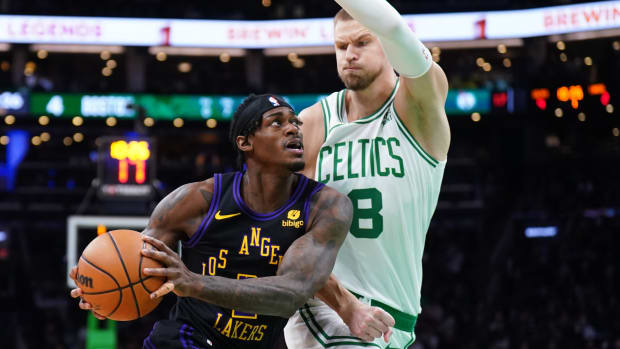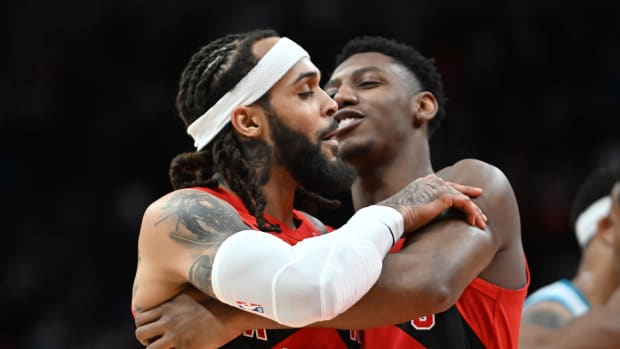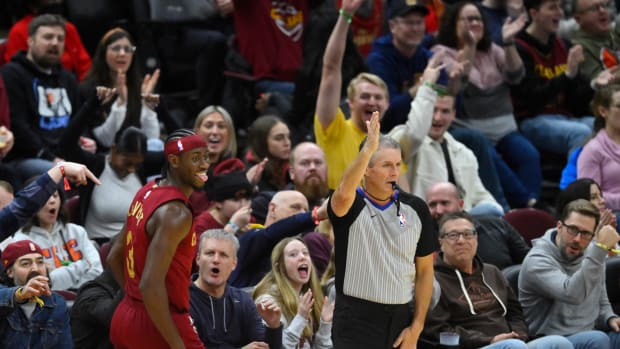Analyzing the $100 Million Lawsuit Against Zion Williamson and CAA
At around 7:30 p.m. ET tonight, NBA commissioner Adam Silver will appear on a stage in the Barclays Center and utter these words:
With the first pick in the 2019 NBA Draft, the New Orleans Pelicans select Zion Williamson from Duke University.
The 6’7, 284-pound forward will then stand, greet his family, walk towards the stage, don a Pelicans cap that will be handed to him and shake Silver’s hand. It will be all smiles for arguably the most promising new player to enter the league since LeBron James in 2003.
When Williamson’s NBA career excitedly takes off tonight, it won’t be free and clear of controversy.
In fact, more than $100 million is the subject of federal and now state court litigation involving the ACC Player of the Year and the ACC Rookie of the Year.
Two weeks ago, the 18-year-old sued Prime Sports Marketing, a Florida based company, and its president, Gina Ford, in the U.S. District Court for the Middle District of North Carolina. As explained in an accompanying Sports Illustratedlegal story, Williamson insists that a contract he signed with Prime Sports in April to represent him in endorsement deals is void and illegal under North Carolina’s Uniform Athlete Agent Act (UAAA). Williamson intends to have CAA Sports represent him in negotiations for both his forthcoming employment contract with the Pelicans and lucrative endorsement deals with various companies. CAA basketball agent Austin Brown and CAA executive Lisa Joseph-Metelus will primarily handle Williamson’s dealings.
Ford, who has represented Usain Bolt and other athletes in endorsement deals, has now struck back. And she hopes Williamson will pay a hefty price for what she depicts as Williamson and CAA conspiring to steal her work and brazenly breach a contract that Williamson had willingly signed.
Late Wednesday, Ford and Prime Sports filed an 88-page complaint in Miami-Dade County Circuit Court against Williamson, Brown, Joseph-Metelus and CAA. Sports Illustrated has obtained a copy of the complaint and its exhibits. Ford and her company demand at least $100 million in damages, along with other remedies.
Ford is represented by attorney Stephen Drummond of the New York-based law firm Drummond & Squillace. Drummond, who served six years enlisted active duty in the United States Marine Corps and has been honored for his service during the Gulf War, has crafted a detailed complaint with a clear central theme: after Williamson contractually agreed to Ford’s representation and after Ford engaged in substantive negotiations with such major companies as Puma, EA Sports and Mercedes Benz on Williamson’s behalf, Williamson and CAA conspired to unlawfully cut Ford out of the equation.
As explained below, the complaint includes claims for breach of contract, breach of the implied duty of good faith and fair dealings, fraud, tortious interference with a contract, civil conspiracy, unjust enforcement, misappropriation and violation of the Florida Uniform Trade Secrets Act.
Ford’s lawsuit continues the discussion from Williamson’s lawsuit
Understanding Ford’s state court case against Williamson first requires a quick recap of Williamson’s federal court case against Ford. Williamson has retained prominent sports attorney Jeffrey Klein of the New York-based law firm Weil, Gotshal & Mange to represent him.
The crux of Williamson’s case is his assertion that Ford unethically manipulated him into signing a contract that Klein argues violated the law by its very design. As detailed in his complaint, Williamson depicts Ford as aggressively pursuing him, including by repeatedly contacting Williamson and family members earlier this year. He also recalls how on April 20—five days after he declared for the 2019 Draft—Williamson met with Ford and signed a five-year contract labeled “Consulting and Joint Marketing and Branding Agreement.” The agreement contemplated Ford representing him in endorsement deals.
By signing the agreement, Williamson forfeited the possibility of returning to Duke—assuming he hadn’t already forfeited his eligibility. The NCAA does not permit eligible players to negotiate endorsement deals. Under NCAA rules, Williamson had until May 29 to withdraw from the draft and return to Duke. He could do so long as he did not violate NCAA amateurism rules in the meantime.
This was even true if Williamson signed an agent, at least so long as the agent was licensed by the National Basketball Players’ Association (NBPA). Under new NCAA rules that enable underclassmen to obtain more information about their draft prospects before relinquishing the chance to return to school, the NCAA recognizes an NBPA-license as tantamount to an NCAA-license. Again, the agent can’t negotiate endorsement deals for the draft-declared underclassmen who has pending NCAA eligibility. However, the agent can engage in discussions with NBA teams and scouts to gather information about whether the underclassmen should stay in the draft or return to school for another year to improve his NBA prospects.
Ford, who does not hold herself out as a player agent and repeatedly stresses that she only represents clients for marketing and endorsement deals, is not licensed by the NBPA and is thus not licensed by the NCAA. Williamson insists that the contract he signed with Ford broke the UAAA in several ways, including by Ford not registering with the North Carolina Secretary of State’s Office prior to negotiating with Williamson while he was an amateur athlete. As adopted in North Carolina, the UAAA applies not only to employment contracts but also to endorsement deals. Further it requires various contractual disclosures that are not mentioned in Williamson’s deal with Prime Sports.
Ford tells a very different history of her experience with Williamson
Ford, through the complaint authored by Drummond, flatly rejects the depiction of facts offered by Williamson and Klein. As a core point, Ford contends that Williamson was anything but naïve and that, as an adult who willingly and voluntarily signed a contract, Williamson should be ordered to honor his word.
Drummond pivots from that general argument with several specific ones.
First, Williamson is depicted as a sophisticated business actor who, for many months, had contemplated how to maximize his potential earnings. “Williamson is an adult male of high intelligence with exceptional business acumen,” Drummond writes. “He is acutely cognizant of his value as a basketball superstar and of his branding, marketability and earning potential.” Indeed, Drummond maintains that Williamson’s marketability “could rival that and/or surpass NBA legends including, but not limited to, LeBron James, Kobe Bryant and Michael Jordan.” In fact, under this very optimistic projection of Williamson—that he will be remembered along the lines of all-time greats—Williamson could soon earn $1 billion between endorsements, his NBA contract earnings and related business dealings.
Second, Drummond rejects the assertion that Ford manipulated or pressured Williamson. Just the opposite, Williamson, his mother, Sharonda Simpson, and stepfather, former college basketball player Lee Anderson, are characterized in Ford’s complaint as identifying Ford as an industry professional who could help Williamson best assess endorsement opportunities.
Along those lines, Drummond says that throughout the ‘18’- ‘19 basketball season, Williamson, Simpson and Anderson, “knowingly, voluntarily, intelligently and strategically began to research and evaluate which marketing firms and/or agents would best serve to help propel Williamson to become [a] marketable international and worldwide rainmaking superstar.” To that end, Williamson and his family researched potential marketing agents and focused on ones of particular interest.
While doing so, they “identified and learned of Prime Sports Marketing and Gina Ford, and of their proven history of successful domestic and international branding and marketing of athletes.” Ford has done work related to NBA players, including a collaboration with Kevin Durant’s mother, Wanda Durant, in negotiations for the Lifetime movie The Real MVP: The Wanda Durant Story. Williamson, his family and Ford are portrayed by Drummond as having engaged in various discussions about endorsement opportunities.
Williamson and his family are thus not regarded as vulnerable targets of a calculating and duplicitous agent. Instead they are seen as seasoned operators who, after careful deliberation, identified Ford, a marketing expert, as the person to lead their efforts.
Third, Drummond asserts that Williamson effectively made the decision turn pro in February and thus theoretical NCAA eligibility for a sophomore season that would never happen was a moot point before Williamson declared for the 2019 NBA Draft.
During a nationally-broadcast game between the Blue Devils and the UNC Tarheels on Feb. 20, Williamson suffered a right knee sprain after his sneaker abruptly tore apart. “Williamson realized,” Drummond declares, “that by continuing to play at the collegiate level, risking injury, could jeopardize his dream of becoming an NBA player.” A month later, Williamson allegedly made clear to those around him that although he returned to play for the Blue Devils “out of loyalty,” he “absolutely” would not be returning to Duke for a sophomore season.
Drummond thus rejects the notion that Williamson was intent on preserving his NCAA eligibility after declaring for the NBA Draft on April 15. “Williamson, with his mother and stepfather, knew and/or had reasons to know that Williamson was not testing the waters by declaring for the 2019 NBA Draft,” Drummond writes. “For all intent and purpose, [Williamson] knew that he would be drafted, knew that he would be drafted as the No. 1 Draft pick and knew that he would be accepting whichever team selected him and that he was never returning to play collegiate basketball ever again.”
While Williamson’s complaint regards the April 20th signing as the time when Williamson lost his NCAA eligibility, Drummond asserts that Williamson had already lost his eligibility by that point. Drummond contends that Williamson had: (1) agreed orally or in writing to be represented by any individual other than a NCAA-certified agent; (2) accepted benefits from an individual other than an NCAA-certified agent; and (3) entered the NBA Draft on April 15 without any intent to return to college.
Ford contends Williamson and CAA conspired to misappropriate her work
Throughout the complaint, Drummond stresses the amount of work performed by Ford on Williamson’s behalf. This theme is important because it suggests that she was financially damaged by Williamson’s attempt to terminate his contract with her.
For instance, on April 28, Ford, Williamson, Simpson and Anderson allegedly met with representatives from a “shoe/sneaker company” that Ford had contacted. According to Drummond, the group discussed a deal involving “monetary compensation of an immediate $100 million” to Williamson if he agreed to sign the contract. The complaint also references Ford arranging for Williamson to appear on the cover of Slam Magazine and how Ford worked with Williamson during the magazine’s photo shoot at Duke in late April.
The complaint further describes Ford as traveling to Chicago in mid-May for the 2019 NBA Draft Lottery. She appeared with Williamson “as his exclusive Global Marketing Agent.” Drummond also notes that during the lottery proceedings, Ford and Josephs-Metelus met and “discussed that [Ford] was representing Williamson as Williamson’s exclusive Global Marketing Agent.”
A week later, and allegedly “at the request of Williamson and his parents,” Ford travelled to California to meet with Anderson (Williamson’s stepfather) to “provide him Ford’s extensive and comprehensive marketing plan that included the numerous multi-million dollar strategic branding and endorsements and opportunities that Ford had obtained for Williamson.” The list of companies with whom Ford claims to have negotiated on Williamson’s behalf is long and impressive. It includes Puma, Activision Publishing (Call of Duty video game); EA Sports (NBA Live); 2K Sports (NBA 2K); General Mills (Wheaties), Beats by Dre, Chase Bank, Harper Collins, Monster Hydro, Burger King, Mercedes Benz, T-Mobile, Kraft Heinz, Powerade (Coca-Cola) and Biosteel.
Drummond also stresses that until late May, Ford was repeatedly assured by Williamson and his family that while Williamson would hire an NBPA-licensed agent to negotiate Williamson’s employment contract with the Pelicans, Ford would be Williamson’s agent for endorsements and other marketing opportunities. This very arrangement was memorialized by the five-year contract Williamson signed with Ford/Prime Sports, a contract that only permitted termination “for cause” (meaning a mistake so serious by one contracting party that it permits the other party to terminate the contract without penalty).
Yet Drummond also describes CAA as aggressively angling to persuade Williamson to agree to a more comprehensive representation—and one that would negate the need for Ford in Williamson’s life. To that end, Drummond highlights that Duke head coach Mike Krzyzewski is represented by CAA. Williamson also reportedly signed with CAA on May 30, a day after he in theory could have still withdrawn from the NBA Draft and returned to Duke for his sophomore season.
It would be logical for CAA to seek to represent Williamson in endorsement deals. The fact of the matter is that NBA agents often generate more earnings from representing star players in endorsement deals than in player contracts. The NBPA limits agent commissions on most player contracts to 4%. Endorsement contracts, however, have no agent commission cap. The accompanying commission is often between 10% and 20%, sometimes higher. This earnings dynamic is particularly apparent with rookie players, whose salaries are suppressed by a rookie wage scale and thus whose financial value to agents is primarily through endorsement opportunities.
On May 31, Ford realized with certainty that everything had changed for the worse. On that day, a representative of Williamson emailed Ford with a message from Williamson. The message was clear: the agreement Williamson signed with Ford “is hereby terminated is hereby terminated and voided effective immediately . . . you are to cease all efforts and outreach on my behalf.”
Companies with whom Drummond says Ford was negotiating on Williamson’s behalf then shut her out of further conversations. For instance, on June 3, Marci Gales from EA emailed Ford with the following message:
Ford’s legal claims and likely defenses by Williamson and CAA
Drummond hopes the Miami court will see the facts from his client’s vantagepoint. With that in mind, the complaint asserts that Williamson breached the contract he signed with Ford. As noted above and in the accompanying SI story on Williamson’s lawsuit, the claim for breach is premised on the fact that Williamson could only terminate the contract “for cause,” a condition which has not been met. Yet, as Klein detailed in his complaint on behalf of Williamson, the contract could be viewed as unenforceable and void if the court regards it as in violation of the UAAA.
Ford’s complaint also asserts that Williamson breached an implied duty of good faith and fair dealing as well as committed fraud. These are fairly straightforward claims: As Drummond tells it, Williamson acted in bad faith by side-dealing with CAA while he was contractually obligated to Ford and while Ford was negotiating with multiple companies on Williamson’s behalf. Williamson will undoubtedly dispute this characterization. He will insist that his conversations with CAA stemmed from a desire to maximize his professional interests and gain representation from an elite firm. Williamson will likely also contend that he has not signed endorsement deals, and that any negotiations by Ford were merely preliminary talks.
The complaint also takes aim at CAA and both Brown and Joseph-Metelus. They are sued for civil conspiracy and tortious interference with contractual relations under the theory that they intentionally damaged Ford’s professional opportunities—namely, depriving her of a 15% commission from Williamson’s sponsorships and endorsements. They purportedly did so by “intentionally, wrongfully and unlawfully undermining the terms and conditions” of Williamsons’ contract with Ford and by “intentionally, wrongfully and unlawfully telling/informing/communicating to Williamson, and/or to his mother and/or to his stepfather, that since Defendants are better suited to serve as Williamson’s marketing and branding/firm agent.” In response, expect CAA, Brown and Joseph-Metelus to stress that Williamson and his family make their own decisions. Further, recruitment of athlete clients is what CAA and other agencies are in the business of doing.
Ford’s lawsuit also argues that all of the defendants violated Florida’s trade secrets act. The act makes it unlawful to misappropriate trade secrets, which include classified strategies and various types of confidential materials. Ford charges that the defendants have been conferred unlawful benefits by contacting the companies with whom she had negotiated tentative deals—remember, she met with Williamson’s stepfather in late May to share her marketing plan—and then took over negotiations and directed the companies to cease communications with Ford. Basically, this claim contends that Ford’s work product was stolen, and that she won’t reap deserved compensation. As a defense, respect the defendants to stress that Williamson had a legal right to know the kinds of deals Ford was negotiating and that commissions are paid on completed deals, not possible deals.
Ford demands at least $100 million and court orders to enforce Ford’s contract with Williamson and order CAA to stop negotiating on Williamson’s behalf
Ford’s argument that she has suffered $100 million in damages is premised on the assertion that she negotiated substantial deals on Williamson’s behalf and will be denied those proceeds for reasons she argues constitute illegal acts. She seeks additional compensation in the form of punitive (punishment) damages to reflect her contention that Williamson and CAA committed “omissions, conduct and/or failures [that] were intentional, malicious, reckless, wanton, extreme, outrageous, in total and/or reckless disregard and deliberate indifference to the lawful rights and entitlements of Ford and Prime Sports.” Whether these damages are provable would be up to a jury should the case ever go to a trial. Expert testimony, including from other agents and sports marketing professionals, and empirical analysis would be crucial.
More immediately, Ford demands a declaratory judgment from the court that her contract with Williamson is enforceable and that Williamson’s attempt to exit constitutes breach of contract. Further, she petitions the court to enjoin CAA from further negotiations on Williamson’s behalf.
Where the two cases go from here
The litigation has become more complex with Ford suing Williamson in Florida state court over a set of facts that previously led Williamson to sue Ford in North Carolina federal court.
As a pragmatic matter, the two sides are engaged in “forum shopping.” Their goal is to litigate in a forum with the most advantageous law and legal practices. Williamson would prefer to sue in North Carolina due to the state’s UAAA and due to the fact that potential jurors would include persons with favorable views of Duke players.
Ford sees Florida as more favorable law given that, with respect to college athletes, Florida law does not impose the same contractual requirements on marketing agents as it does on player agents. Florida is also where Ford and Prime Sports are based. In addition, the contract Ford signed with Williamson includes a term expressing that it is governed by Florida law.
Hearings will be scheduled to determine the appropriate forum. Williamson will stress that he sued first (the party who files first often prevails in forum debates) and that Williamson and Ford met up in North Carolina. In contrast, Ford will stress that the contract she and Williamson signed is governed by Florida law and that many facts in the dispute arose in Florida.
Although it’s possible this dispute could become the basis of a trial, the far more likely outcome is that it is resolved with an out-of-court settlement. It’s clear that Williamson wants CAA, not Ford, to represent him. Whether Williamson handled the change in representation in a lawful and ethical way is unknown and, at this point, depends on which retelling of facts you believe.
However, given that Williamson will soon sign endorsement deals, neither his CAA agents nor the companies with whom they are negotiating would want a cloud of pending litigation over the negotiations—particularly since if Williamson signs an endorsement deal with a company with whom Ford already negotiated, it’s possible that Ford will, in turn, seek a court order directing the company to pay the commission to her and not to CAA.
Like many litigations, expect this one to end in a settlement. Chances are it won’t follow Williamson too long into his very promising NBA career. But it may require some of his money to make it go away.
Michael McCann is SI’s Legal Analyst. He is also an attorney and Director of the Sports and Entertainment Law Institute at the University of New Hampshire Franklin Pierce School of Law.
































